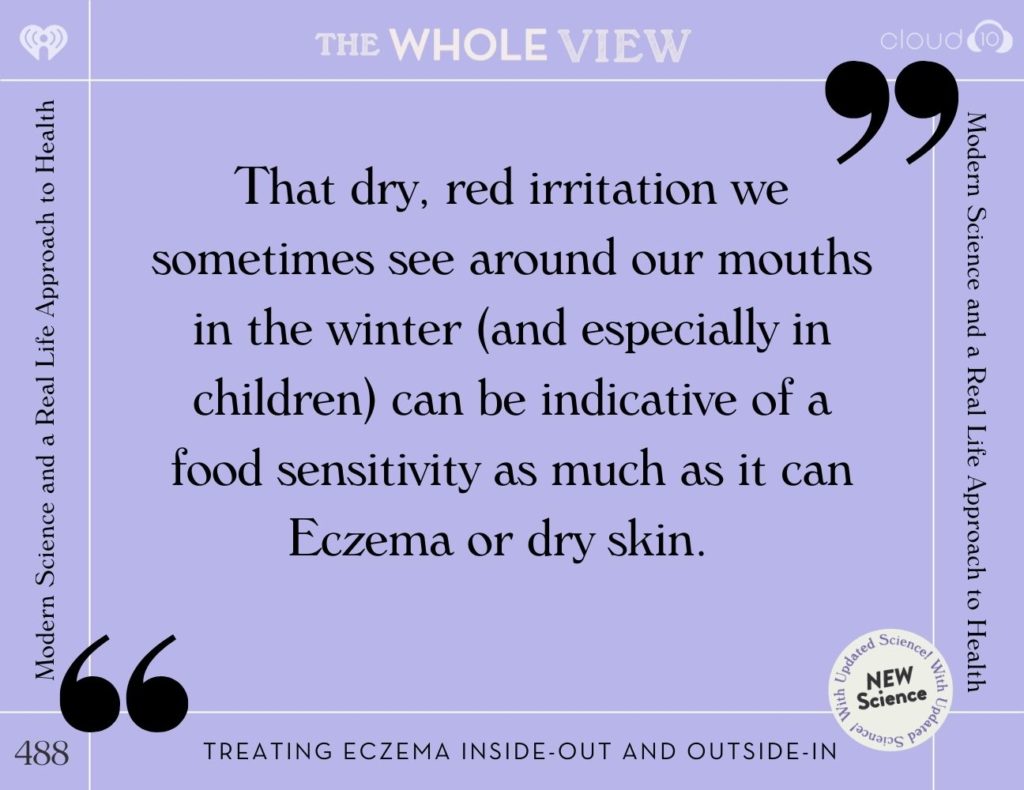On this episode of The Whole View podcast, Stacy and I answer a listener question about eczema! We first revisit nutrients and dietary strategies for skin problems, such as taking vitamin D supplements, consuming fish oil, and doing an elimination diet by removing commonly problematic foods such as gluten, dairy and eggs.
Table of Contents[Hide][Show]
.We then update these foundational recommendations with new science on the gut-skin axis, as well what impact a healthy microbiome can have on skin health. In particular, I discuss the neuroendocrine connection between our gut bacteria and skin health. For example, gut dysbiosis can impact the serotonin produced in the gut, which culminates in an itch-scratch response, thus also compromising the integrity of the skin from the outside-in! I summarize the most impactful probiotic species for supporting skin health, and Stacy wraps up with her expert skincare tips that include hydration, exfoliation, treatment, and moisturizing, as well as the important SPF routine to help protect your skin from harmful sun damage.
If you enjoy the show, please review it on iTunes
Listener Question from Emily
I had Eczema on body (arms, knees, groin, hands, belly) which started in my mid 30s and became most severe during my fourth pregnancy at age 37. Multiple treatments tried including acupuncture, naturopathic supplements did not achieve much improvement. In late 2018, I did Whole 30 diet twice and saw marked improvement, and then transitioned to a paleo diet. All eczema cleared by 2020, with very small areas on hand remaining. Fall 2020, eczema on lips started. I don’t have eczema anywhere else now. I am now wondering if this perioral dermatitis is related to my previous eczema and how to treat it. Now that it is fall, the lips are beginning to worsen. Thank you! – Emily
Key Takeaways
- Eczema, also called atopic dermatitis, is a chronic condition caused by inflammation in the outermost layer of skin, and which is characterized by symptoms such as redness, swelling, itching, dryness, crusting, flaking, blistering, cracking, oozing, or bleeding.
- Eczema is very responsive to changes in diet, including upping nutrient intake with a Nutrivore focus and avoiding inflammatory foods and foods that you may be sensitive to. It’s also important to test vitamin D levels and supplement accordingly.
- There is a strong link between skin health and the gut microbiome. In particular, gut dysbiosis drives inflammation as well as modulates neurotransmitters known to be involved in eczema development. Bacteria that are really important for skin health include Lactobacillus and Bifidobacterium species, especially Lactobacillus plantarum, Lactobacillus reuteri, Lactobacillus brevis, Lactobacillus paracasei and Faecalibacterium prausnitzii.
- Dr. Sarah’s best resources for diet for gut health are her Gut Health Guidebook and Gut Health Cookbook
- It’s also important to avoid skin irritants and to nourish skin with healing fats in skin care products.
- Stacy shares her favorite products. Dr. Sarah recommends YoRo Naturals.
Recommended Reading and Listening
- TWV Podcast Episode 431: Troubleshooting Dry Winter Skin
- Paleo for Eczema
- 4 Tips to Combat Eczema
- 7 Tips for Quick Eczema and Itchy Skin Relief – Guest Post by Jennifer Roberge
- How to Heal Eczema Through Mind and Body – Guest Post by Jennifer Roberge
- The Right Clothing for Eczema (Why Fabric & Dyes Matter!) – Guest post by Jennifer Roberge
- The Emotional Impact of Eczema – Guest Post by Jennifer Roberge
- Free Guide to Eczema can be found in Dr. Sarah’s Free Member’s Area
Citations
Sinha S, Lin G, Ferenczi K. The skin microbiome and the gut-skin axis. Clin Dermatol. 2021 Sep-Oct;39(5):829-839. doi: 10.1016/j.clindermatol.2021.08.021. Epub 2021 Sep 3. PMID: 34785010.
Salem I, Ramser A, Isham N, Ghannoum MA. The Gut Microbiome as a Major Regulator of the Gut-Skin Axis. Front Microbiol. 2018 Jul 10;9:1459. doi: 10.3389/fmicb.2018.01459. PMID: 30042740; PMCID: PMC6048199.
Strandwitz P. Neurotransmitter modulation by the gut microbiota. Brain Res. 2018 Aug 15;1693(Pt B):128-133. doi: 10.1016/j.brainres.2018.03.015. PMID: 29903615; PMCID: PMC6005194.










